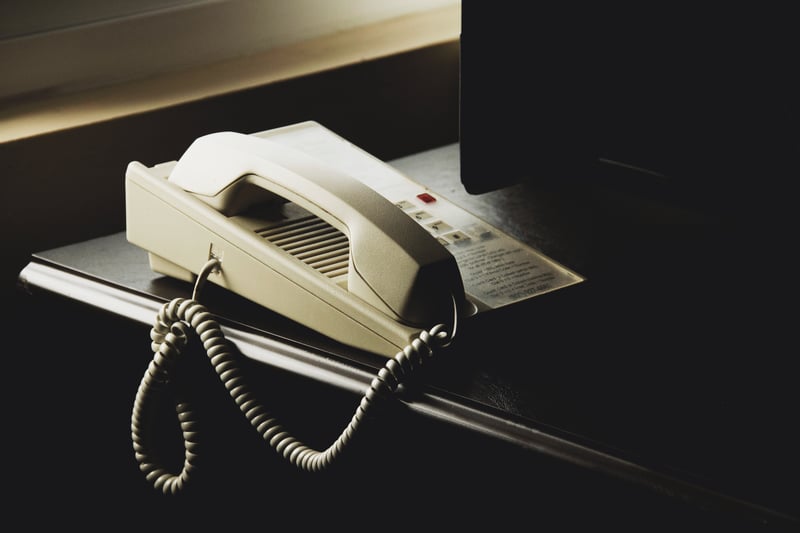Do We Still Need Desk Phones?
With the rapid advancement of technology and the ever-evolving communication landscape, the traditional desk phone may no longer be the go-to communication tool for businesses. In recent years, desk phone usage has declined sharply as more companies seek alternatives that offer greater flexibility and cost-effectiveness.
So, the question is, do we still need desk phones in today's digital age?
Why the Decline?
The percentage of businesses still relying on desk phones varies depending on the industry and location. However, according to one survey, 70% of small businesses in the U.S. still use desk phones. Meanwhile, larger companies with more than 50 employees are more likely to use alternative communication methods, with only 42% using desk phones as their primary communication tool.
It's worth noting that while many businesses still rely on desk phones, the trend is shifting towards alternative communication methods, such as web phones, cloud-based phone systems, and mobile applications on cellular devices. As these technologies become more widely adopted and accessible, the percentage of businesses using desk phones will likely continue to decline.
The decline in desk phone usage can be attributed to several factors, including advancements in technology and changes in the way we work.
1. The rise of mobile devices. With the widespread adoption of smartphones and tablets, many people now prefer to use these devices for communication, both in their personal and professional lives.
2. Increase in remote work. The COVID-19 pandemic has accelerated the trend toward remote work, further decreasing the need for traditional desk phones. As more employees work from home or other remote locations, they require communication tools that are accessible from anywhere and on any device.
3. Cost. Traditional desk phones can be expensive to purchase and maintain, especially for businesses with multiple locations or remote employees.
4. They lack features that consumers want. Modern communication tools offer a wide range of advanced features that are not always available with traditional desk phones. Businesses are increasingly seeking communication tools that provide a full suite of features rather than just basic calling capabilities.
Overall, the decline in desk phone usage is part of a broader shift towards more modern and flexible communication tools. By embracing alternatives to traditional desk phones, businesses can increase their flexibility, scalability, and cost-effectiveness while enjoying a wider range of advanced features.
So, what's the alternative?
Alternative 1: Web Phones
Web phones, also known as softphones, are a popular alternative to traditional desk phones. They are software-based communication tools that allow users to make and receive calls over the internet using a computer or other internet-enabled device.
One of the primary advantages of web phones is their accessibility. As long as a user has an internet connection, they can use a web phone to make and receive calls from anywhere in the world. This makes them ideal for businesses with remote or distributed teams, as they allow employees to stay connected no matter where they are. Additionally, web phones can be used on a wide range of devices, including laptops, smartphones, and tablets, further increasing their accessibility.
Cost-effectiveness is another significant advantage of web phones. Traditional desk phones can be expensive to purchase and maintain, especially for businesses with multiple locations or remote employees. Web phones, on the other hand, are accessible on the computer already provided by the company. Additionally, web phones don't require any hardware installation or maintenance, further reducing costs.
Scalability is another benefit of web phones. As businesses grow and add new employees or locations, they can easily scale their cloud-based phone systems to accommodate new users. Web phones are often included in the user license and are accessible as soon a user has been added. This is much easier than scaling a traditional phone system, which often requires the installation of new hardware and the reconfiguration of existing systems.
Alternative 2: Cloud-Based Phone Systems
Cloud-based phone systems are another popular alternative to traditional desk phones. They're software-based communication tools that allow users to make and receive calls over the internet using a cloud-based infrastructure.
One of the primary advantages of cloud-based phone systems is their flexibility. Like web phones, they allow users to make and receive calls from anywhere, as long as they have an internet connection and can be used on a wide range of devices.
Cloud-based phone systems are significantly easier to scale as they don't require new hardware or software reconfigurations. Cloud-based phone systems are also more cost-effective than traditional phone systems, as they often require minimal upfront costs and then a monthly subscription fee.
Advanced features are another benefit of cloud-based phone systems. They offer a wide range of features, including voicemail to email, call routing, simultaneous ring, auto-attendant, and more. Additionally, many cloud-based phone systems integrate with other communication tools, such as video conferencing and instant messaging, allowing for a more seamless and integrated communication experience.
It's important to note that while web phones and cloud-based phone systems aren't the same, they're often used together. For example, a business might use a cloud-based phone system with desk phones as its primary phone system at their headquarters, but also provide web phones as an alternative for remote workers or employees who prefer to use their computers for phone calls.
Alternative 3: Mobile Applications on Cellular Devices
Mobile applications on cellular devices are another alternative to traditional desk phones. These systems use mobile applications to allow users to make and receive phone calls on their smartphones, using a their business phone number provided by the VoIP provider.
One of the primary advantages of mobile applications is their mobility. Users can make and receive phone calls from anywhere as long as they have a stable internet connection and they have download the VoIP provider's mobile app. This makes mobile applications ideal for businesses with employees who are frequently on the go or work remotely. Additionally, users can use their existing smartphones, eliminating the need to purchase additional hardware.
Another advantage of mobile applications is their cost-effectiveness. They often are free to download and are bundled in their monthly cloud-based phone system subscription fee which can be much less expensive than traditional desk phones. Additionally, mobile applications can be easily scaled to accommodate new users, making them a good choice for growing businesses.
Mobile applications also offer a range of advanced features, such as visual voicemail, call forwarding, call parking, chat and SMS, and caller ID. Some mobile applications also integrate with other communication tools, such as video conferencing and CRMs.
An All-In-One Solution
With on-premises phone systems and traditional desk phones, companies have to use a variety of software and tools to get the most basic level of function that could be found in a VoIP phone system. Within one system, VoIP offers numerous alternatives including breaking away from the traditional desk phone.
Better yet, Simplicity VoIP offers all these alternative communication methods to businesses looking to modernize their communication systems.
- With a web phone solution, businesses can enjoy a cost-effective and flexible alternative to traditional desk phones.
- Our cloud-based phone system offers a more robust and feature-rich option for businesses with more complex communication needs.
- Our mobile applications provides users with a mobile and cost-effective solution–perfect for remote and mobile workers.
By transitioning from a desk phone to one of the options of a VoIP system, businesses can stay connected and productive, no matter where they are or what communication method they prefer. As the demand for more modern and flexible communication systems continues to grow, Simplicity VoIP is ready to help your business adapt and thrive in a changing landscape.
Ready to make the switch?







